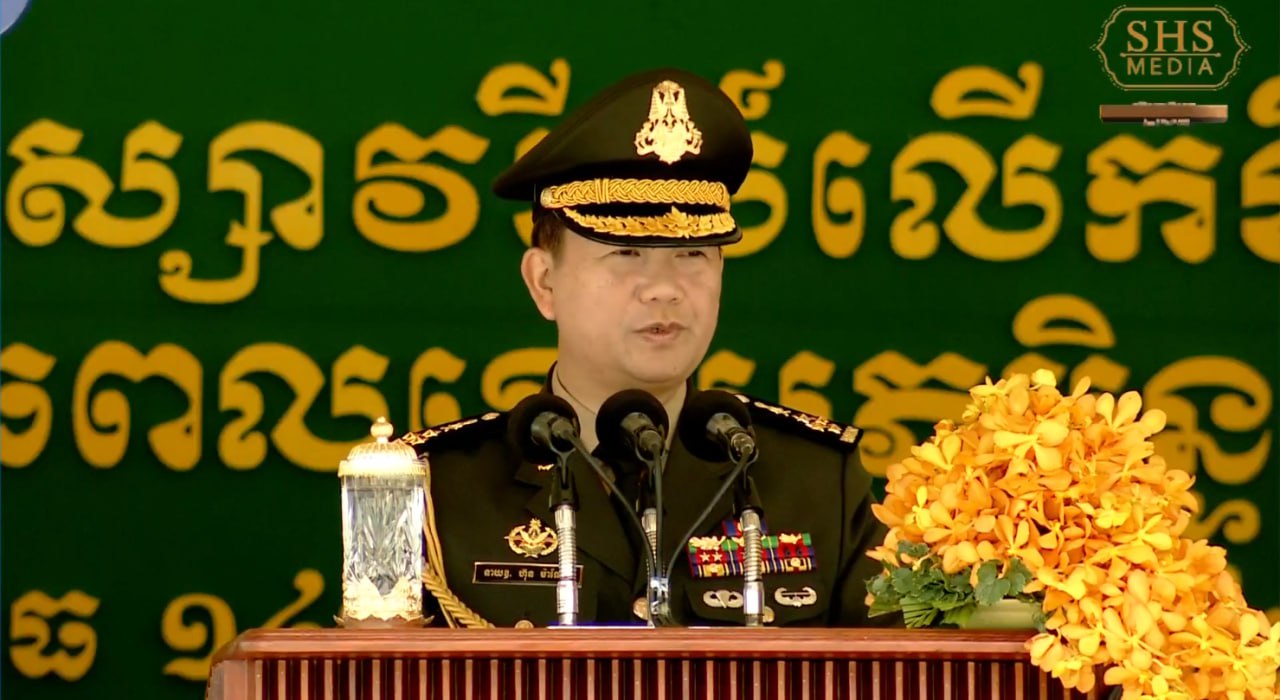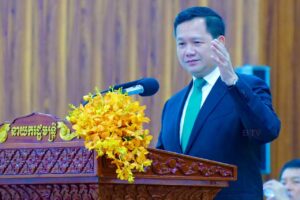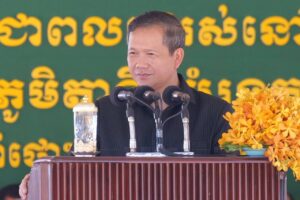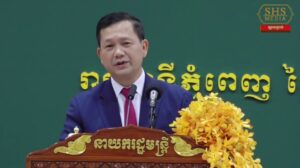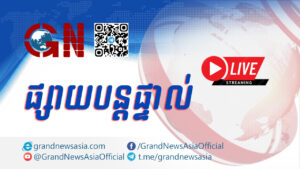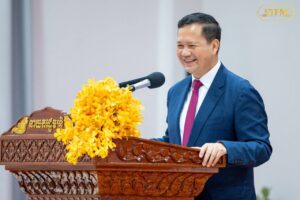Selected Comments Samdech Moha Bovor Thipadei Hun Manet, at the celebration of the “25th Anniversary of the Establishment of the Royal Cambodian Armed Forces, 24 January 1999 – 24 January 2024”
[Unofficial Translation]
*********
(1) Although established in 1999, the army has a history of contributing to the liberation of the country from genocidal regimes and preventing the return of this regime
Although the army command was established 25 years ago on January 24, 1999, the Army’s officers have been involved in all stages of the nation’s development, from participating in building the National United Front for Salvation of Kampuchea in 1978 […] for more than 40 years of the evolving situation of our country, the army and its officers participated in all stages, even under the umbrella of the army command, which was established in 1999. The first stage was the liberation of the country from the genocidal regime and the prevention of the return of this regime […] the National United Front for Salvation of Kampuchea, which was organized on December 2, 1978, and led to the overthrow of the genocidal regime of Pol Pot on January 7, 1979, is largely a force that has now become the Cambodian army […]
(2) While they can make war, the army can also contribute to ending the war
At the time that we ended the war, and we hosted national unity under the win-win policy in 1998 […] (we saw that) the army was an important factor. The army can start a war but it also plays an important role in ending the war. The 1970s coup caused by the army plunging the country into the flames of war, and divisive territory. But in 1998, thanks to the participation of the army on all sides, especially the army of the former Khmer Rouge […] and if it were not for the participation of the army and the commanders of every division, the participation of the political leaders of the former Khmer Rouge organization, ending war would not have been successful […]
(3) The Army is at the core of the 1998 win-win policy implementation
In the time of implementing the win-win policy of Samdech Akka Moha Sena Padei Techo and the participation of key operators, the armies from all sides, both the Royal Government and the Khmer Rouge, were the core forces, from where many of the commanders are now working together. This includes also officers who are still in duty, who have retired, while some have died, and some have gone on to political positions. The main thing is they wear the same uniform and work under the same name. Among them, the main force is the army, which has been transformed from two different forces into one – the force of the Royal Cambodian Armed Forces. Therefore, the participation of the army is central to the successful implementation of the 1998 win-win policy […]
(4) Triangle Strategy from 1998 to 2003 was for maintaining peace
In the first phase of the implementation of the Triangle Strategy between 1998-2003, the so-called national unification phase, the core of it was the pacification or to maintain peace. Samdech Akka Moha Sena Padei Techo (set out this strategy). What does pacification mean here? It is to keep the peace that we just achieved in 1998 (and that) ended the 500-year war (to last) sustainably. That means all forces stop going back to fighting. A temporary ceasefire would not have been so sure to end a war without trust […]
(5) The establishment of the army command headquarters in 1999 plays a central role in sustainable integration
The establishment of the Army Command Headquarters in early 1999, after the end of the war, played a central role in maintaining this mechanism. All forces were integrated from other divisions of the former Khmer Rouge’s. In certain cases, we have joined together the forces (of the former Khmer Rouge) with the government troops to form divisions. Without a coordinated leadership mechanism, integration may not be sustainable, as forces that had been fighting for more than 30 years, and/or planning with distrust on each other for more than three decades, may not be able to build trust in one day. It takes time […] I thank the officers at all levels for their contribution to making the win-win policy a lasting solution to extinguish the 500-year war in our territory. With the involvement of the armies that come together without fear and distrust, we are now one national army, and we have succeeded […]
(6) The national construction phase of the Rectangular Strategy between 2003 to 2023 transformed internal fighting into the army that strengthens national defense capacity
The second implementation phase is the national construction according to the rectangular strategy between 2003-2023, which has been the foundation for our country’s development so far. Peace and social stability have been the vital foundation so far […] (the rectangular strategy had) transformed the capabilities of our army from an internal warfare army into one that strengthens the capacity to defend the nation. This peace has noted an important role and participation of the armed forces, which also includes that of our army […]
(7) The army participates in implementing the vision – “Cambodia is a landmine-free country by 2025”
There needs to be an engineering team to demine and to build roads […] in time of war, the engineering team was to lay mines. Should there be a need to blow off the bridge, the military engineering team was the one to do the job. In time (of peace), it is their job to rebuild […] for Cambodia, some of our mines are difficult (to remove) and so far we are proud to have liberated many provinces from mines in line with the vision of the Royal Government, according to the wish of Samdech Techo that “Cambodia will become a landmine-free country by 2025.” Our army has been actively involved in this work […]
(8) The army promotes national honor through peacekeeping missions under the United Nations umbrella
To raise high the national honor on the international stage, our army has also participated in missions under the United Nations umbrella not only to protect the peace of our country but also to help maintain peace in other countries. During the visit to France, there has been a request for Cambodia to consider sending more troops, because our army has a reputation and honor, to help maintain peace in other countries. However, the article 53 of our Constitution states that we do not allow any Cambodian military bases outside the country, unless under the auspices of the United Nations. We will continue to work with UN mechanisms to maintain peace in the countries […]
(9) The army reforms to protect the territory, defend the nation, and bring peace to the people
The Army has also undergone many reforms over the past 25 years to become an army that emerges from integration, maintains unity, becomes a strong-minded national army, and strengthens its capacity to defend its territory, nation and peace for the people […] the change through the coup made us miserable. So do not trace this history back. (Not to let) this occurs in the Angkor territory. The army must fulfill its core task (to keep the peace) […] what is the basis for army reform? The army reform must be based on the spirit of nationalism […] no matter how it is, do not lose the identity and spirit in national defense. Absolute loyalty to the nation and the people is the basis and spirit of the military reform base – to defend the nation, religion, the king and maintain absolute peace […]
[3]
(10) Three spirits of nationalism – absolute loyalty, strengthening army capability and rasing high the national prestige
The three spirits making the basis of reform are (1) absolute loyalty (to) the motherland to protect national peace, religion, the King; (2) strengthen the army to become a national army with the ownership capability in all areas; and (3) participate in promoting prestige of the nation on the international stage. These three spirits are the direction of reform, which I call the spirit of nationalism […]
(11) Three readjustments – army structure, capacity, and equipping
In the five-year reform phase from 2018 to 2023 […] we have been doing a lot and continued to adjust on this basis, to strengthen the achievements, to maintain the positive achievements built from the difficult phase until we have many achievements in 2018, and to work for more improvement. All of these adjustments are based on three principles – adjusting the structure and strengthening the system of work; building the capacity of the army; and equipping improvement, including self-assurance capabilities […]
(12) Cannot fight future wars based on all past tactics
I urge the army command […] to continue to review, if necessary, for further structural reforms. The changing situation, the evolving technology, and the evolving tactics require our forces to evolve as well. We cannot fight in future wars based on all past tactics […] to ensure reform success, we must examine and ensure the need to study new technologies, the introduction and use of modern technologies […]
The type of risk also varies. The risk of attacks or the eruption of large-scale traditional wars, the army involvement, the division against division has grown less or almost gone through the government’s policy of linking diplomacy, politics, economy together […] we must continue to strengthen other professional leadership lines […] to assure logistics, technical assurance, as well as the management of all other skills to be consistent and smooth in the leadership command through the hierarchical command channels […] we also continue to reform and strengthen the working order, both in the army and in the General Command of the Ministry of National Defense, in order to strengthen the order, consolidating the foundation and labor standards stronger and responding to the needs of the situation […]
(13) Build the capacity of the army, especially ensure the sustainable capability
Second, building the capacity of the army is an important task, but ensuring the sustainability of the army’s capability/capacity […] to sustain the capacity and constantly increase the defense capability of our army in the future for hundreds of years to come […]
If we talk about ensuring long-term military capabilities, we need to talk about training. Training is about strengthening schools. Strengthening schools requires strengthening military trainers. Of course, documents are important, equipment, teaching methods are important, but it depends on the human. If we have a strong military trainer, s/he can lead every work, no matter where we get the documents from, or otherwise, no matter how good training documents, without a capable military trainer, the teaching is not fruitful. Strong military trainers is important […]
The army has done a good job in strengthening the seven schools under the its supervision. The Commander-in-Chief worked hard to strengthen the schools under its supervision and the Ministry of National Defense also strengthened the schools under its supervision. In addition to strengthening the seven schools, the army also took care in setting up training sites and found some land to set up training locations […]
We have underway the setting up of three more military academies (including) one for tank skills, one for artillery skills, and one for air defense skills. This is to strengthen every skill based on the spirit of nationalism or to achieve self-mastery in all areas, especially the training in all skills […]
(14) Military diplomacy vision to maintain peace and friendship between countries
We have built cooperation with our allies in training, joint exercises or military diplomacy […] military diplomacy is to join together defending peace and building friendship between countries […] to increase cooperation, build mutual trust, and together deal with common problems such as transnational crime, drugs and counter-terrorism, which we have been doing for the last 5 years […]
[…] This military diplomacy is in line with our vision and direction […] we have signed friendly relations with many countries such as Japan, China, Korea, the Philippines, Singapore and many other ASEAN countries. We need to continue to expand this partnership […] the more friends the better, the better the cooperation, the better the joint exercises […]
(15) Encourage/provide qualifications to military trainers throughout the armed forces
[…] I have implemented a number of principles to encourage military trainers within the ranks of the army […] this work should be considered for the entire army and the national police […] and figuring out the possibility to encourage, to empower and to improve qualification of the military trainers and teachers in the army (or the armed forces) […] you need to discuss this issue with the Ministry of Economy and Finance, the Ministry of National Defense and the Ministry of Interior […]
(16) Continue adjusting training programs and lessons to meet the needs from top to bottom
Third, please continue to adjust our training programs and training lessons to meet the needs from top to bottom […] all aspects/fields must take training into consideration. On-site training, formal training, plus maintenance skills, regular reminders in frontline units […]; fourth, providing equipment, including capabilities and self-assurance […]
Cambodia has no ambition to invade anyone. Cambodia strengthens its defense capabilities as it is the right of a country, like all countries in the world. No country forbids the modernization of its defense. We strengthen the army’s ability to participate in maintaining peace and stability within Cambodia and beyond. If there is a situation of terrorism or any problem that requires Cambodia’s participation, we will do our part […]
[…] let me reaffirm that the capacity building of the Cambodian army, navy and air forces is for the Cambodian national defense and not for making war with any country at all […] Cambodia modernizes its army and armed forces not only to defend the nation and protect its territorial integrity, but also to increase its ability to participate in maintaining peace and stability in the region and the world […]./.

